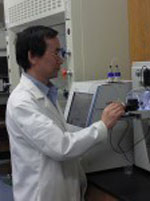
- Name: Xinzhu Pu, Ph.D.
- Institution: Boise State University
- Department: Biomolecular Research Center
- Phone: (208) 426-2233
- Email: shinpu@boisestate.edu
Summary: My research interests include ECM disruption in doxorubicin-induced cardiotoxicity, the effects of microgravity on autophagy during mesenchymal stem differentiation, methodologies in mass spectrometry-based proteomics and metabolomics, and natural product drug development.
Minimum classes: N/A
Projects:
1. Effects of doxorubicin on the remodeling of cardiac ECM
Doxorubicin is an effective and frequently used chemotherapeutic drug for many different types of cancer. However, doxorubicin can cause cardiotoxicity and cardiomyopathy, which is often fatal. A lot of effort has been devoted to finding the mechanisms of this adverse effect. Most of the research focuses on cardiomyocytes. Although there are indications that doxorubicin may cause damages to the extracellular matrix (ECM) in the heart, more systematic and in-depth investigations in this aspect are needed. In this project, primary fibroblasts and endothelial cells from mouse heart will be cultured and treated with doxorubicin. The production and degradation of key ECM molecules will be evaluated. The techniques that will be used in the project include cardio fibroblast isolation, cell culture, protein purification, PCR, western blotting, and mass spectrometry-based proteomics analysis.
2. Role of Autophagy in Osteogenic Differentiation of Mesenchymal Stem Cells under Simulated Microgravity
Microgravity experienced by astronauts in spaceflight results in bone loss that has been attributed to the decrease of bone formation caused by impaired osteoblast function, as well as increased bone resorption caused by increased osteoclasts activity. The molecular mechanism of microgravity-induced bone loss is not fully understood. Evidence shows that microgravity can inhibit the transformation of MSCs into osteoblasts and may, in turn, impair formation of new bone tissue. Autophagy is known to play an important role in MSC differentiation. Thus we hypothesize that autophagy regulates microgravity-induced inhibition of osteogenic differentiation of MSCs and modulation of autophagy level can enhance the differentiation of MSCs into osteoblasts. In order to test our hypotheses and achieve our research objectives, we will expose MSCs from bone marrow to simulated microgravity. We will conduct experiments to accomplish two objectives, 1) examine the role of autophagy in the impaired osteogenic differentiation of MSCs under simulated microgravity, and 2) test if we can increase differentiation of MSCs into osteoblasts by modulating the autophagy level.



